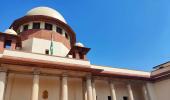All political parties including Bharatiya Janata Party are in favour of freebies and due to this a judicial attempt has been made to deal with it, said the Supreme Court on Tuesday while deliberating with a PIL opposing promises of such handouts by the parties during polls.

The top court also rapped Dravida Munnetra Kazhagam and some of its leaders for making statements on the issue of freebies and the judicial intervention on the ground that welfare measures are for uplifting marginalised people and cannot be held as “freebies”.
“On this issue, I can say all political parties are on one side including BJP. Everybody wants freebies. That is the reason we made an attempt,” a bench comprising Chief Justice N V Ramana and Justices Hima Kohli and C T Ravikumar observed during the hearing.
The intention was to initiate a “wider public debate” on the issue and for this purpose, the setting up of the committee was mooted, the bench said, adding “We have to see what is a freebie and what is welfare."
The bench said it has to balance the equity and it was not against any policy of the government or the scheme.
“Some said, we have no right to entertain. No right to look into the issues...See, if tomorrow, somebody comes to us and says that we are not the beneficiaries of the scheme... Can we say no? We cannot deal with this. See, we have to balance it. We are not against any policy of the government. We are not against any schemes...,' the bench said.
During the hearing, as soon as senior advocate P Wilson commenced submitting on behalf of the DMK, the bench referred to some statements of party leaders and came down on them.
“Mr. Wilson (senior advocate P Wilson, counsel for DMK), I am sorry to say this. I wanted to say so many things. But I am not saying so being the Chief Justice of India. The party and the minister which he (a lawyer) is talking about...I don't think that wisdom only belongs to a particular person or a particular party. We are also responsible..,” the CJI said.
At the outset, senior advocate Kapil Sibal, whose assistance has been sought by the bench, mooted the idea of setting up a panel of the statutory finance commission.
He said as per the Fiscal Management Responsibility Act, if some freebies are given, then the benefit cannot go beyond 3 per cent.
“This issue needs to be dealt with through a system and not politically. If states exceed allocation it will result in beyond 3 per cent deficit and if the deficit exceeds then the next year's allocation can be reduced by the Finance Commission,” he said.
The bench took note of the suggestions and said that the debate was necessary and asked whether judicial scrutiny was permissible if there were a central law on it.
Sibal said that the judiciary has the power to test the validity of any law.
"For example, some states give cycles to the poor and women. It is reported that bicycles have improved lifestyle. The problem is which is a freebie and which can be said to be a beneficiary for the upliftment of a person. For a rural poverty-stricken person, his livelihood may depend on that small boat or bicycle. We cannot sit here and argue on this,” the CJI said.
Solicitor General Tushar Mehta said that nobody has an issue with the social welfare schemes and the difficulty arose when a party distributed non-essentials such as television sets etc.
He referred to the promise of free electricity by some parties and said that some of the PSUs are bleeding financially.
"The voter has a right to make an informed choice. If you are giving him false promises which your finances do not permit or you are destroying the economy... It is a serious issue leading to disastrous economic consequences," the law officer said.
Senior advocates Vikas Singh, Vijay Hansaria, and Gopal Sankarnarayanan appeared for PIL petitioner Ashwini Upadhyay.
Singh said the political parties were deflecting the issue and trying to make a legal problem into a political one.
Political parties were hijacking the issue by calling it social welfare, he said, adding that in reality, it was an issue about fiscal discipline and if it is not dealt with effectively then the country can go bankrupt.
He gave the illustration of Sri Lanka.
"No one is saying that we should not give free water and electricity. What we are saying is that there is already governance going on in a state. You are contesting for elections there and saying I will provide additional benefits. These additional benefits will require fiscal support. Where will you get the money from? The voter has a right to know, the taxpayer should know that this money is going from my pocket. Election manifestos must provide where the money will be coming from,” he said.
Senior advocate AM Singhvi, appearing for the Aam Aadmi Party, said that the PIL petitioner was seeking a gag order without saying so.
AAP said that targeting and regulating electoral speeches will amount to “nothing more than a wild-goose chase” if the concerns are over the fiscal deficit due to the promises of freebies made during polls by political parties.
The top court was hearing a PIL filed by lawyer Ashwini Upadhyay, which opposes the practice of political parties promising freebies during elections and seeks the Election Commission to invoke its powers to freeze their election symbols and cancel their registration.










